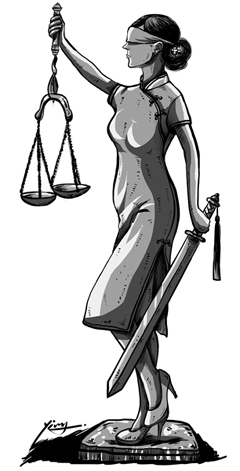Probes into both domestic and foreign-funded enterprises are push for a more regulated market order and maturer mechanisms
Twelve Japanese auto parts and ball-bearing makers were fined nearly 1.24 billion yuan ($201 million) on Wednesday for price fixing and monopolistic activities. It is the largest fine imposed on companies since the National Development and Reform Commission and State Administration for Industry and Commerce launched the anti-trust probes, which have also covered enterprises such as Microsoft, Mercedes-Benz, BMW and Audi apart from domestic brands.

Since most of the companies penalized are globally renowned, some foreign media outlets have accused China of targeting foreign enterprises. But the fact is the anti-trust move includes domestic and foreign companies and is aimed at building a healthy market.
Although China introduced the Anti-Monopoly Law six years ago, its enforcement has up to now been weak. It was only in 2013 that the NDRC intensified its anti-trust probes to create a level playing field for domestic and overseas enterprises, and promote fair competition. Fair competition is the precondition for effective allocation of resources in the market. From the perspective of economics, monopoly of a market can neither eliminate competition nor develop itself for long. Only with effective regulation on monopoly and monitoring of market activities can order be maintained in a fair and healthy market - and this is true for markets in Western countries as well as in China.
China's market supervision mechanism is not foolproof, and monopoly can evolve through unfair measures in market competition. Some companies have used their advantages in resources and market access to push up the prices of their products and/or increase their sales, which have not only thwarted fair competition but also affected the allocation of resources in the market.
For example, Audi, one of the companies facing an anti-trust probe, used to call meetings and force the 10 4S showrooms in Hubei province to comply with its pricing strategy and the showrooms had to agree to the product and services costs. Such monopolistic activity made fair competition among auto manufacturers and dealers impossible, violated consumers' rights and harmed China's auto industry. But after the anti-trust probes intensified, many high-end auto brands have been forced to reduce prices, this has helped restore some order in the market and facilitated fairer competition.
But the anti-trust probes are not just targeted at overseas companies. This is proved by the fact a huge fine - 451 million yuan - was imposed on China's two top liquor makers, Kweichow Moutai and Wuliangye Yibin Group, last year. The reason some people may suspect that the probes target foreign companies is that most enterprises under investigation command a considerable market share in developed countries.
The irony is that the same companies that abide by strict laws in developed countries and face heavy penalties for violating them try to ride roughshod over rules in China to grab a larger share of the Chinese market, where commodity pricing, income and economic development and the Anti-Monopoly Law are very different.
After the launching of reform and opening-up more than three decades ago, China offered preferential policies for a long period to attract foreign investment. And the foreign investment that flowed into China helped boost the country's economic growth. But the preferential policies also made foreign companies assume that they could continue enjoying them and increase their stakes in the Chinese market forever. Even though the preferential tax policy for foreign companies was annulled in 2008, many local governments in China continued to offer favorable tax policies to various degrees to attract foreign investment.
Some foreign auto companies have taken advantage of such favorable policies to control supply channels and manipulate the prices of vehicles and auto parts, forming a vertical monopoly and drastically increasing prices, which have hurt the interests of consumers. Such practices have to be eradicated to develop a healthy market atmosphere in China, and the foremost thing to do is to create a level playing field for domestic and foreign enterprises.
The anti-trust probes have yielded remarkable results so far, with the penalized auto companies expressing their willingness to cooperate with regulators and abide by the rules, and the others offering aggressive reduction in the prices of either their vehicles or auto parts.
But since the intensive anti-trust campaign has also given rise to anxiety among many foreign companies operating in China and such a development is not conducive to building an open and fair market economy, regulators have to ensure that the investigations are more transparent and carried out strictly according to established procedures. They also need to give domestic and foreign companies a stable institutional guarantee of fair play.
China's market economy is still rather immature compared with those of developed economies and its anti-trust mechanism and measures need further improvement and standardization. In the long run, relevant departments such as the NDRC, SAIC and the Ministry of Commerce should work together to establish a foolproof supervision mechanism to investigate and evaluate law-enforcement procedures and help strengthen a fair and open market.
In the meantime, both domestic and foreign companies should recognize the long-term power of the anti-trust probes and desist from indulging in monopolistic activities and price fixing.
Zhang Jianping is director of the International Economic Cooperation Institute for International Economic Research, NDRC, and Ma Xinyue is a researcher at Peking University.
